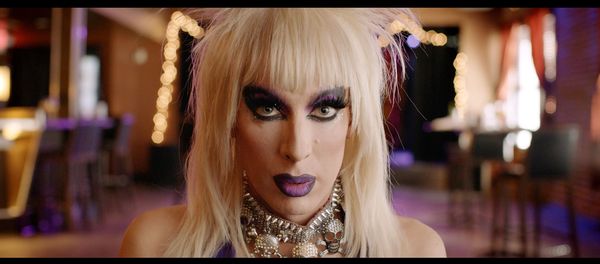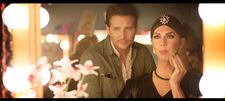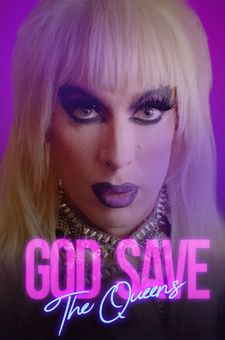 |
| God Save The Queens |
Every film festival needs a bit of glamour, and director Jordan Danger delivers it in spades with God Save The Queens, one of the highlights of this year’s Outfest. What’s more, she does so in a way which is challenging and thoughtful, with a story about getting older on the drag scene, navigating old rivalries, helping newcomers and dealing with people whose main agenda is exploitation. When we met up early in the festival, I asked her how it all began.
“Originally, I wrote this film as a short movie,” she explains. “It was a short film that we made about Marmalade’s characters specifically. It was about an ageing drag queen trying to make it, on her last legs, and that was always what really was profound to me, especially growing up being an actress and feeling like you're sort of on a timetable, you know, when your your youth is running out at all times. I assumed that for a career like drag it would feel very similar. So I wanted to make that story. And then once we had made that and started telling her story, and it just felt so right and sort of serendipitous, I had the idea to write multiple other characters and tie them in together. So the way it came together wasn't all of them from the beginning, which was a pretty interesting way to write. I've never done it that way before, but I'm really happy that it worked out the way it did.”
How did she find her stars? Some of them are clearly established drag performers.
“Yeah,” she says. “I knew from the beginning, when I was writing, that I didn't want to get regular actors and throw them in drag roles. I'd rather have drag queens who’ve actually experienced that animosity, who had had those experiences and were able to project that on screen as well. So it was it was a tougher process. There's a smaller pool of performers. A lot of drag queens like to perform and lip sync and dance, but not all of them are necessarily actors. So it was a matter of weeding through that. We just got some amazing talent auditioning. Kelly Mantle, who played Marmalade, was unbelievable in the room. I feel like we got very, very lucky with our cast.”
Some of them knew each other to begin with, she adds.
“Kelly Mantle, Alaska [Thunderfuck] and Laganja [Estranja] have all done the Drag Race circuit together. They've worked in other shows together. I know Alaska and Laganja had a previous relationship, which was great, because their storyline was essentially always them around each other, so it was cool to see that drag sisterhood with them already. Jordan [Green] was a fresh face but fit in immediately. So I don't know, it was pretty effortless for them. You know, they've been all working together with each other for years, so that was really cool.
“I've always told my actors ‘I have something on a page that I would essentially love to see on the screen. But if something doesn't feel right to you, or you want to say something a different way, or something just happens during the scene where you go off in a completely different direction, I’d more than love to see that.’ And they did, you know? They were amazing at being prepared. They took their characters and they put them on these paths in their own directions. I mean, they completely added to the story. It was really all them.”
 |
| God Save The Queens |
Though it’s mostly set backstage and elsewhere, the film includes some scenes of drag performance. Did she write those or simply give her stars room to do their thing?
“I wrote some of it, like I said, they were so good at coming up with little quips on their own. I told them that from beginning, ‘You know what? You guys do this for a living and you're so good at it that if you have something funnier or better, if it's more in tune with yourself, go out there and say that. That was something Kelly Mantle did a lot during her speech. You know, she has a speech at the end of the film where she basically expresses everything that has been bottled up – and Kelly added so much of herself into that speech that I could never have put pen to paper and come up with some of the things that she came up with.”
I tell her that I was very much interested in the themes around ageing, because I think in acting there is that expectation that women are there to be decorative and men are there to be charismatic, and in drag people get to be a bit of both, but one never knows whether or not the charisma will be enough for them to be able to carry on as they get older. She tells me that it’s a theme which presented an unexpected problem at the audition stage.
“When Kelly came into audition, she was much younger than we were originally looking for. We were looking for Marmalade to be well into her fifties. And that was my big hesitation with Kelly coming in, because I was like, ‘She's still young and very pretty and I don't know if it's going to work out.’ But she delivered such a rawness to it, and it just came through. I can't speak on behalf of drag queens, how they feel in their personal careers and how each of them feels about ageing, you know, I'm sure some of them are fine and some of them are as freaked out as I am. But I think it's kind of interesting, anytime you're in a field like that, whether it's acting modelling or, you know, even dancers. I just always wondered to drive with similar because if you're performing as a female, you know, you wonder if people are viewing you in the same way.
“For me, I've been acting my whole life. I'm 31 now and it's just, it feels different. It's always felt different as you get older as a woman – and there's men who are becoming successful and booking their first role in their forties. It's a lot more difficult for women in the industry, but I don't know, I think as long as we keep telling those stories, and we keep having women of that age actually playing these characters, I think it's going to be really profound and real for women of the same age who are watching.”
At a festival like Outfest there is inevitably quite a lot of focus on youth with a lot of films, so did she feel that she might be making a different kind of contribution by bringing a film about older people to that audience?
“Yeah, I think so. If you notice, the amount of drag queens that have come on the scene in the past few years, then you know, it's become a lot more accessible because of shows like drag race, it's just more common. So a lot of young drag performers are getting really good at it really quick. So I think that for some of these seasoned queens, who’ve done it for a long time, it's just cool to be able to see them show that there's a lot that you can gain from watching their experience and how great they are at it. They were unbelievable to see.”
 |
| God Save The Queens poster |
She mentioned Drag Race, and in some ways the TV companies are the bad guys in this film, because there is a theme of exploitation...
“Yeah, I think that's why I wanted to insert some of that into the film. You know, there's a lot of cisgender and straight performers who inevitably bring on drag queens to try and get more audience, and a lot of these communities are paid hardly anything to be doing the work that they're doing. So I know not everyone's like that, I just wanted to speak to the fact that there are those adversities that they have to deal with, whether it be a show which wants to have a drag queen on for the sake of just showing a drag queen. I wanted to tell their stories on a more personal level, obviously: their experiences at home, their experiences with each other. I didn't want to make drag seem like a gimmick in the film. That was really important to me. You know, I wanted it to be essentially a film about people who just happen to be that, and not necessarily a drag queen movie.”
I tell her that I liked the character of Nolan, who has Down syndrome, because that isn't somebody we normally see in that kind of context.
“Zack Gottsagen,” she nods. “I watched him in Peanut Butter Falcon and I just couldn't get him out of my head. I just thought he was such an amazing actor, I couldn't believe he wasn't nominated for it. It’s another ostracised community, those with Down syndrome. I just thought, how cool would it be if there's this ambitious young man who wants to do drag, who just so happens to have Down syndrome, and where people take that seriously. When he got on board, he was so excited about the role and he just committed so heavily. It was a blast, an absolute blast.”
We discuss the therapy sessions featured in the film, and I ask if she approached that primarily as a framing device or if it was it something which she was interested in exploring in its own right.
“I think that it's a little bit of both, you know? I think we always want to tie them together in a way that put them all on the same playing field, and I just thought it would be this interesting way, if we had them all at the same venue, and maybe that venue didn't exactly make sense. It was a little whimsical, nonsensical, and there's no real drag in therapy, you know, but I thought it would be a really interesting because it shows that it's not a coincidence, they're all there together.
“I thought that maybe that would be the one aspect of the film that wasn't necessarily grounded, it was more outlandish, whimsical. How did they all end up at this resort? I loved the idea of having this feminine energy figure there who was guiding them in a way without even really guiding them, just kind of pushing them to guide themselves. And I just thought it would tie everyone together and wrap it up in a bow, the way that they never actually needed the help, they always had it inside themselves.”
Being at Outfest is a dream, she says.
“I'm so excited. I've always loved Outfest. It's just such a cool spot for our film to be, especially given that so many of the attendees at Outfest are such big drag supporters as well. It's really cool to have queens like ours be able to go there. We're going to do a little performance before the film, and I just think the energy and everything is perfect for our movie.”
God Save The Queens screens at Outfest tonight.





















